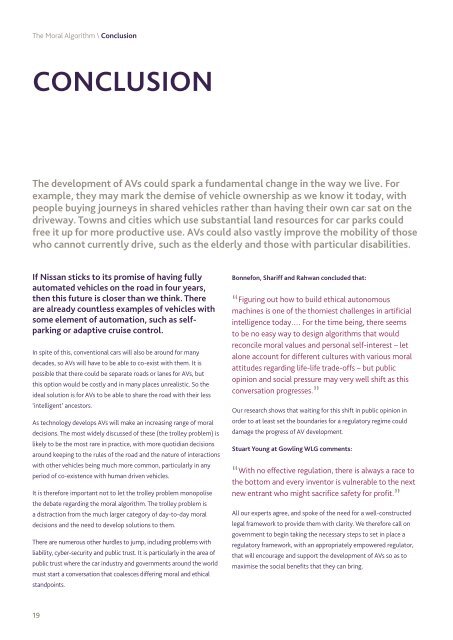THE MORAL ALGORITHM
161205-the_moral_algorithm
161205-the_moral_algorithm
Create successful ePaper yourself
Turn your PDF publications into a flip-book with our unique Google optimized e-Paper software.
The Moral Algorithm \ Conclusion<br />
CONCLUSION<br />
The development of AVs could spark a fundamental change in the way we live. For<br />
example, they may mark the demise of vehicle ownership as we know it today, with<br />
people buying journeys in shared vehicles rather than having their own car sat on the<br />
driveway. Towns and cities which use substantial land resources for car parks could<br />
free it up for more productive use. AVs could also vastly improve the mobility of those<br />
who cannot currently drive, such as the elderly and those with particular disabilities.<br />
If Nissan sticks to its promise of having fully<br />
automated vehicles on the road in four years,<br />
then this future is closer than we think. There<br />
are already countless examples of vehicles with<br />
some element of automation, such as selfparking<br />
or adaptive cruise control.<br />
In spite of this, conventional cars will also be around for many<br />
decades, so AVs will have to be able to co-exist with them. It is<br />
possible that there could be separate roads or lanes for AVs, but<br />
this option would be costly and in many places unrealistic. So the<br />
ideal solution is for AVs to be able to share the road with their less<br />
‘intelligent’ ancestors.<br />
As technology develops AVs will make an increasing range of moral<br />
decisions. The most widely discussed of these (the trolley problem) is<br />
likely to be the most rare in practice, with more quotidian decisions<br />
around keeping to the rules of the road and the nature of interactions<br />
with other vehicles being much more common, particularly in any<br />
period of co-existence with human driven vehicles.<br />
It is therefore important not to let the trolley problem monopolise<br />
the debate regarding the moral algorithm. The trolley problem is<br />
a distraction from the much larger category of day-to-day moral<br />
decisions and the need to develop solutions to them.<br />
There are numerous other hurdles to jump, including problems with<br />
liability, cyber-security and public trust. It is particularly in the area of<br />
public trust where the car industry and governments around the world<br />
must start a conversation that coalesces differing moral and ethical<br />
standpoints.<br />
Bonnefon, Shariff and Rahwan concluded that:<br />
Figuring out how to build ethical autonomous<br />
“<br />
machines is one of the thorniest challenges in artificial<br />
intelligence today…. For the time being, there seems<br />
to be no easy way to design algorithms that would<br />
reconcile moral values and personal self-interest – let<br />
alone account for different cultures with various moral<br />
attitudes regarding life-life trade-offs – but public<br />
opinion and social pressure may very well shift as this<br />
conversation progresses.<br />
”<br />
Our research shows that waiting for this shift in public opinion in<br />
order to at least set the boundaries for a regulatory regime could<br />
damage the progress of AV development.<br />
Stuart Young at Gowling WLG comments:<br />
With no effective regulation, there is always a race to<br />
“<br />
the bottom and every inventor is vulnerable to the next<br />
new entrant who might sacrifice safety for profit.<br />
”<br />
All our experts agree, and spoke of the need for a well-constructed<br />
legal framework to provide them with clarity. We therefore call on<br />
government to begin taking the necessary steps to set in place a<br />
regulatory framework, with an appropriately empowered regulator,<br />
that will encourage and support the development of AVs so as to<br />
maximise the social benefits that they can bring.<br />
19


